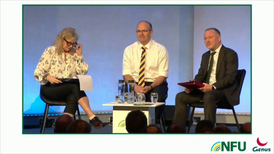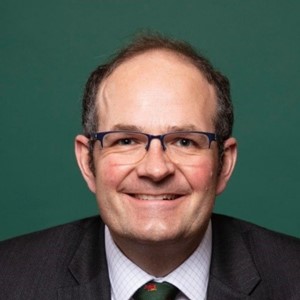A Q&A session after Mr Reed had given a speech as part of the political session that opened the event was dominated by the planned changes to Agricultural Property Relief and Business Property Relief and the impact on farming family businesses.
Asked by session chair Charlotte Smith what he thought about the tax policy and its impact on his ability to deliver his agenda, Mr Reed said he was genuinely sorry about the shock the decision had created.
Labour had inherited a much tougher set of financial circumstances than they had expected and needed to stabilise the economy, he said, adding: “I think the key thing I can do is focus on building profitability in this sector so farmers get a decent return for all the effort they put in for the job that they do.”
Tax changes overshadow the conversation
One member told Mr Reed his 90-year-old mother was “wishing her life away” ahead of the tax changes coming in in April 2026.
Joe Stanley, NFU county chair for Leicestershire, Northamptonshire and Rutland, was applauded when he told him the tax changes were the issue that was overshadowing everything else and was “sucking all the oxygen out of the room for everything else we might talk about”.
Asked what the government was actually doing to create the environment to incentivise investment and growth in the sector, Mr Reed said stability was fundamental to investment and “what we’ve not had for the past 14 years is stability. You’ve had chop and change in policy, Prime Ministers and Chancellors, volatility in interest rates”.
He added: “We’re trying to build stability in the economy so we can get the confidence to invest in this economy in every single sector. Growing profitability attracts more investment.”
Three principles for 25-year roadmap
“We’ll work in partnership with farmers to make farming and food production sustainable and profitable.”
Defra Secretary Steve Reed
In his speech to Conference, Mr Reed said improving profitability is the key to making farming and growing businesses viable for the future, boosting food security and giving British farming the bright future it deserves.
Announcing a raft of policy measures he said were designed to put money back in farmers’ pockets, he said: “The underlying problem in this sector is that farmers do not make enough money for the hard work and commitment they put in.
“I will consider my time as Secretary of State a failure if I do not improve profitability for farmers up and down this country.
“My focus is on ensuring farming becomes more profitable because that’s the best way to make your businesses viable for the future. And that’s how we ensure the long-term food security this country needs,” he said.
“This approach will underpin our 25-year Farming Roadmap and our Food Strategy, where we’ll work in partnership with farmers to make farming and food production sustainable and profitable.”
He said the Roadmap would stand on three principles – a sector that has food production at its core; where farm businesses are more resilient in withstanding the climatic and disease shocks that periodically disrupt farming; and that recognises restoring nature is essential to sustainable food production.
HLS payment increase
Mr Reed also reaffirmed the government’s commitment to protect farmers and growers in future trade deals by upholding environmental and animal welfare standards, and ruled out the import of hormone-treated beef into the country.
To crack down on the importation of illegal meat products, he announced he was working with the Home Office and Border Force on plans to seize and crush vehicles used by criminal gangs involved in doing this, after 92,000 kg of products were seized at ports across the UK last year.
Following concerted lobbying by the NFU, the Secretary of State announced a £30 million investment in increasing Higher Level Stewardship payments with immediate effect, to bring them more in line with other farming schemes.
Paying tribute to the farmers involved in HLS, he said: “These farmers are the pioneers of nature-friendly farming, often abased in upland areas. They deliver high quality environmental outcomes. Now, finally, they will get a fair price for their work.”
Almost 50,000 farm businesses were now in government environmental schemes and around half of farmland in England was being managed to enhance nature while producing food, he added.
SWS, biosecurity and grant funding
Among the other announcements he made were:
- Extending the Seasonal Worker visa route for five more years to give businesses certainty, while acknowledging visa numbers would be gradually reduced as alternative solutions were developed;
- New requirements for government catering contracts to favour high-quality, high-welfare local produce – a step towards the government’s manifesto commitment for at least 50% of food supplied into the public sector to be from British producers;
- A £200 million investment in strengthening Britain’s biosecurity through the creation of a new National Biosecurity Centre;
- A £110 million investment in technology through the Farming Innovation Programme and Farming Equipment and Technology Fund; and
- The Home Secretary would be laying legislation this year to better protect agricultural equipment by requiring immobilisers and forensic marking as standard.
“Together we will overcome the challenges this sector faces and give British farming the bright future this country knows you deserve.”
Defra Secretary Steve Reed
By working together, government and the industry could secure a viable, profitable and bright long-term future for farming,” he said.
“There’s a lot to be done to make British farming profitable and viable for the long-term. I know we can only get there if we build the future together.
“Together we will overcome the challenges this sector faces and give British farming the bright future this country knows you deserve.”
Meet the speakers from this session
Tom Bradshaw
NFU President
The home farm is based around arable production but has also diversified into equestrian and renewables.
Tom has represented the NFU from Local Branch Chairman through to Chair of the National Combinable Crops Board.
Tom was elected to the position of NFU President in February 2024.
Responsibilities
- Animal health and welfare incl. bTB
- Trade and standards
- Climate, energy and net zero
- Food supply chain (fair dealing, mergers and acquisitions, competition, regulation)
- Animal ID and movements
- Assurance review
- Taxation and fiscal policy
- Immigration
The Rt Hon Steve Reed MP OBE
Secretary of State for Environment, Food and Rural Affairs
He was elected as the MP for Streatham and Croydon North in July 2024.
The Secretary of State has overall responsibility for the Department for the Environment, Food and Rural Affairs. He has specific responsibilities for:
- budget, including Official Development Assistance (ODA)
- international relations
- senior appointments
- economic growth
Charlotte Smith
Freelance journalist and broadcaster
Charlotte grew up in rural Leicestershire where she became a teenage volunteer for her local radio station before joining the BBC as a local radio trainee reporter – which gave her lots of experience and bad shorthand. She worked as a news reporter and producer in both TV and radio, was a sports reporter for regional TV, a consumer reporter for daytime TV and part of the launch team for BBC 5 Live.
A conversation in a lift led to her joining the BBC’s rural affairs team, initially for a week, but she has now been there for more than twenty years.







